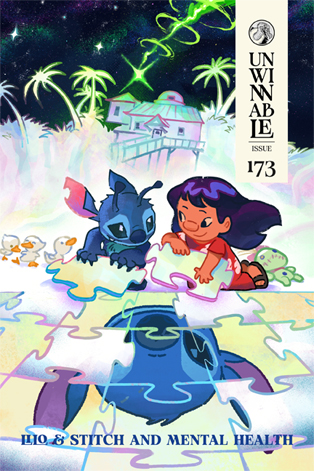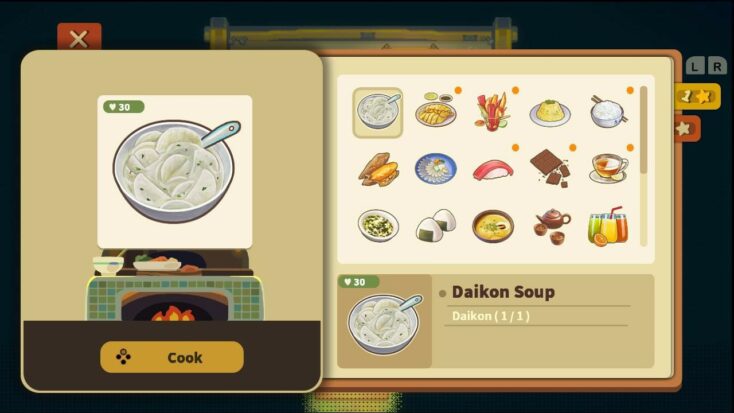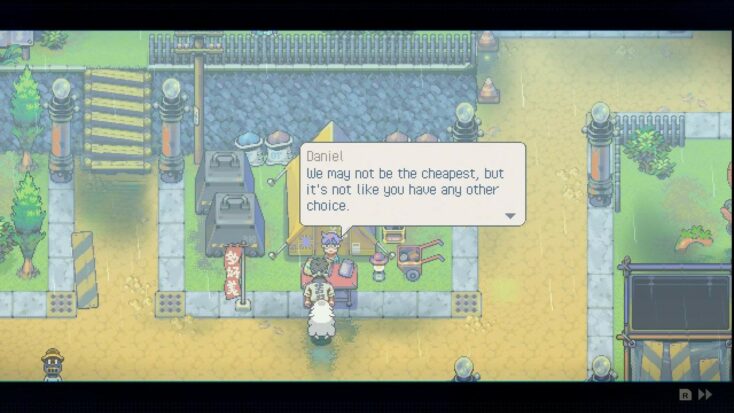
Octopia is a Sweet Farming Sim That Rewrites Eastward’s History

This column is a reprint from Unwinnable Monthly #173. If you like what you see, grab the magazine for less than ten dollars, or subscribe and get all future magazines for half price.
———
What’s left when we’ve moved on.
———
My favorite growable vegetable in Octopia is sweet potato. It can make imoyokan, a sweet paste shaped into cubes. You can grind it into vermicelli noodles, though I don’t know if you can make japchae, which is my favorite thing with sweet potato noodles in it in real life. The first thing you make with it, though, is simply grilled sweet potato. You give it to a former real estate agent whose career was just crushed by the company that sent him out to see you. “Stick a fork in me,” he cries, “I’m done” – then you hand him a jacket sweet potato, and everything is good again.
Simple stories don’t have to overcomplicate themselves to be good. Like the humble sweet potato I grill in my oven when it gets cold outside, Octopia remains sweet and delicious the whole way through, and the whole experience lasts a lot longer than I expected it to. Octopia is a DLC released for a three-year-old game, an RPG called Eastward which followed a man and the mysterious girl he took care of as they attempted to stop the end of the world. Pre-release, this game had more hype than most mid-range retro inspired RPGs, which three years on is now a field that feels semi-exhausted. When it was released, all that buzz muted into a contradictory whimper. It got plenty of reviews – even NPR reviewed it – but most of them concluded that it was merely OK.
For people who really enjoyed the game like me, the announcement that a DLC would be coming more than two and a half years after the original release was a huge surprise. The better surprise was that it was a fully playable farming game, something that is not present in the original at all. In Octopia, you live in an alternate world where the two main characters from the original game have bought, and now need to fix, a broken-down vacation town with an attached farm. It’s an excuse to put two RPG characters into a farming sim, and in doing so to make the full package of Eastward a combo that sounds like an SEO headline’s greatest dream: throwback pixel RPG, plus lighthearted found family farming sim.

This sounds like a cash grab from my description, so I first need to make the important point that this DLC sells for $6. I’ll be real, Octopia is less a DLC and more a tie-in game to Eastward that sells for the price of a nice latte. I say this because of the amount of content – I’m not at the end yet, and I’ve played for 15 hours – but also the lengths Pixpil has gone to in order to improve the experience of the game.
The best example of how Octopia has changed and adapted its source material is with cooking. In the original Eastward, cooking was robust enough. You need a piece of food from one of the major categories – meat, fish, dairy or vegetable – to make dumplings or sushi. Octopia has radically expanded this system, to the point where there’s over 150 recipes. It also made the cooking system match the farm sim it’s now in. Each recipe calls for specific ingredients, and you need all of them to make the dish. Whereas in a game like Stardew Valley, even modded to add more recipes, I find myself making dishes based on what I already have, in Octopia it’s the other way around – I only grew my crops to sustain my cooking.
The DLC gets rid of the most-complained about aspect of Eastward, which is its combat. This is more tied into cooking than you’d think – John, the first main character, is a good chef and fights with his frying pan. Combat relies heavily on placement, and you have to turn in the right direction in order to make an impact. Defensive playing is rewarded, since damage resources are semi-scarce, but there aren’t many options to defend beyond not getting hit. Even as an Eastward enjoyer, I admit it’s frustrating. I got stuck in a sewer sequence and put the game down for six months before I finished it.
However, I’m someone who values the aesthetic experience of a game more than its gameplay. The moment-to-moment experience of fighting can be kinda bad, if the world is interesting. Eastward’s story, while unintelligible at the end, plays with themes of found family and survival against apocalyptic disaster that I found moving. The main characters are fleeing a huge cloud called the Miasma on an overground train for most of the game, watching each community they become a part of get swallowed by the darkness. It’s a sad story that hits some of the same touchstones as Spirited Away, a movie I was frightened of as a kid because of how bluntly it treats loss.

Again, these themes are more important to me than the fact that the story doesn’t make a whole lot of sense. And Octopia has smartly done the perfect thing in this situation: make a follow up that focuses only on tone. The DLC obliterates most of the story of the first game, making you start fresh. It also centers minigames that made the original special, putting them center stage in the DLC. There’s fishing and building in addition to cooking, and side quests where you make recipes for people to get them to move in. You can have all your friends over for dinner. Certain milestones aren’t explained, but the mystery reminded me of playing Harvest Moon on my DS as a kid – walking around without a clue let me accomplish a lot more in the process of figuring it out.
I think Eastward deserved better than the lukewarm reception it got, and I’m sad to see that its DLC seems to have received more of the same. There are almost no reviews of it, though its Steam rating is positive. Octopia represents a studio multitasking: releasing an upgrade in a super-popular genre that’s bound to bring in new players and giving old players something else to do. Eastward was itself a reinterpretation of retro RPGs, and leaned heavy on aesthetics, but never without substance. In its own genre that’s guilty of style over content, Octopia really stands out. Put together the games form a pair of style and substance, if you’re willing to push through some difficult controls and mystifying story in the original. But if you just want to make some radish soup with your neighbors, Octopia is there for you.
———
Emily Price is a freelance writer and PhD candidate in literature based in Brooklyn, NY.




